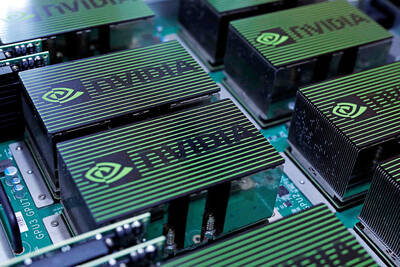Tesla Inc is planning to ship vehicles made at its Shanghai Gigafactory to other markets in Asia and Europe, people familiar with the matter said, as the company looks to realize its plan to reduce shipping costs and manufacture vehicles closer to customers.
China-built Tesla Model 3s intended for delivery outside China would likely start mass production in the fourth quarter of the year, the people said, asking not to be identified because the details are private.
They said the markets targeted include Singapore, Australia and New Zealand, as well as Europe, where customers currently have to wait for a Tesla to be delivered from the US.
Shipments could start as soon as the end of this year, or early next year, the people said.
The world’s biggest maker of electric vehicles is stepping up production as competition intensifies, with traditional automakers starting to make electric vehicles, especially for the Chinese market, where local rivals such as BYD Co (比亞迪) already have a strong foothold.
General Motors Co said this week it plans to take a US$2 billion equity stake in electric truck maker Nikola Corp.
A representative for Tesla in China declined to comment.
Tesla’s main factory is in Fremont, California, where it assembles the Model S, Model X, Model Y and Model 3.
The company is also building a factory near Berlin, its first in Europe. Tesla chief executive Elon Musk is pursuing an ambitious timetable, targeting the middle of next year for that plant to start production.
The billionaire entrepreneur has often spoken about his focus on the consumer, saying that he just wants to make vehicles that people want to buy. Manufacturing the vehicles closer to customers would help Tesla reduce costs and speed up delivery times.
Demand for electric vehicles globally is rising, bolstered by tighter emissions regulations in Europe, and an increasing awareness of climate chang.
While the COVID-19 pandemic has dented sales of all vehicles — global electric passenger vehicle sales were down 15 percent in the second quarter of the year — the market for electric vehicles is forecast to expand about 7 percent this year.
Europe has led the growth, with sales in the continent’s main auto markets more than doubling in the first seven months compared with the same period last year, according to BloombergNEF.

Leading Taiwanese bicycle brands Giant Manufacturing Co (巨大機械) and Merida Industry Co (美利達工業) on Sunday said that they have adopted measures to mitigate the impact of the tariff policies of US President Donald Trump’s administration. The US announced at the beginning of this month that it would impose a 20 percent tariff on imported goods made in Taiwan, effective on Thursday last week. The tariff would be added to other pre-existing most-favored-nation duties and industry-specific trade remedy levy, which would bring the overall tariff on Taiwan-made bicycles to between 25.5 percent and 31 percent. However, Giant did not seem too perturbed by the

AI SERVER DEMAND: ‘Overall industry demand continues to outpace supply and we are expanding capacity to meet it,’ the company’s chief executive officer said Hon Hai Precision Industry Co (鴻海精密) yesterday reported that net profit last quarter rose 27 percent from the same quarter last year on the back of demand for cloud services and high-performance computing products. Net profit surged to NT$44.36 billion (US$1.48 billion) from NT$35.04 billion a year earlier. On a quarterly basis, net profit grew 5 percent from NT$42.1 billion. Earnings per share expanded to NT$3.19 from NT$2.53 a year earlier and NT$3.03 in the first quarter. However, a sharp appreciation of the New Taiwan dollar since early May has weighed on the company’s performance, Hon Hai chief financial officer David Huang (黃德才)

NVIDIA FACTOR: Shipments of AI servers powered by GB300 chips would undergo pilot runs this quarter, with small shipments possibly starting next quarter, it said Quanta Computer Inc (廣達), which supplies artificial intelligence (AI) servers powered by Nvidia Corp chips, yesterday said that AI servers are on track to account for 70 percent of its total server revenue this year, thanks to improved yield rates and a better learning curve for Nvidia’s GB300 chip-based servers. AI servers accounted for more than 60 percent of its total server revenue in the first half of this year, Quanta chief financial officer Elton Yang (楊俊烈) told an online conference. The company’s latest production learning curve of the AI servers powered by Nvidia’s GB200 chips has improved after overcoming key component

UNPRECEDENTED DEAL: The arrangement which also includes AMD risks invalidating the national security rationale for US export controls, an expert said Nvidia Corp and Advanced Micro Devices Inc (AMD) have agreed to pay 15 percent of their revenue from Chinese artificial intelligence (AI) chip sales to the US government in a deal to secure export licenses, an unusual arrangement that might unnerve both US companies and Beijing. Nvidia plans to share 15 percent of the revenue from sales of its H20 AI accelerator in China, a person familiar with the matter said. AMD is to deliver the same share from MI308 revenue, the person added, asking for anonymity to discuss internal deliberations. The arrangement reflects US President Donald Trump’s consistent effort to engineer